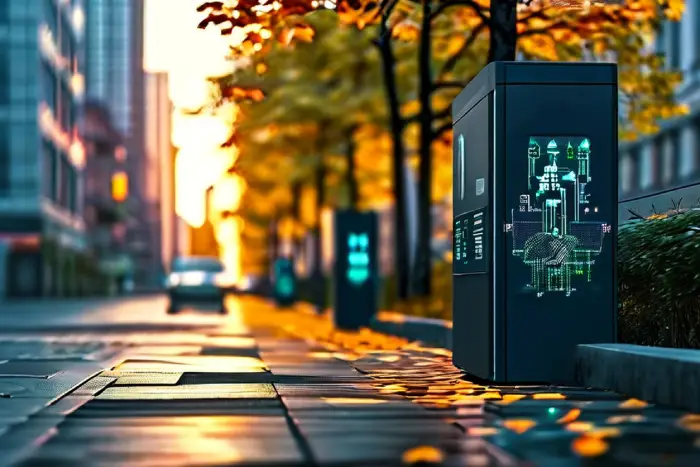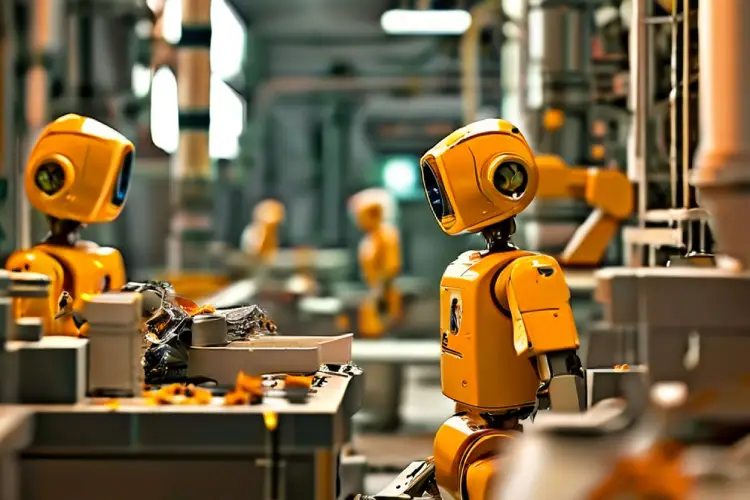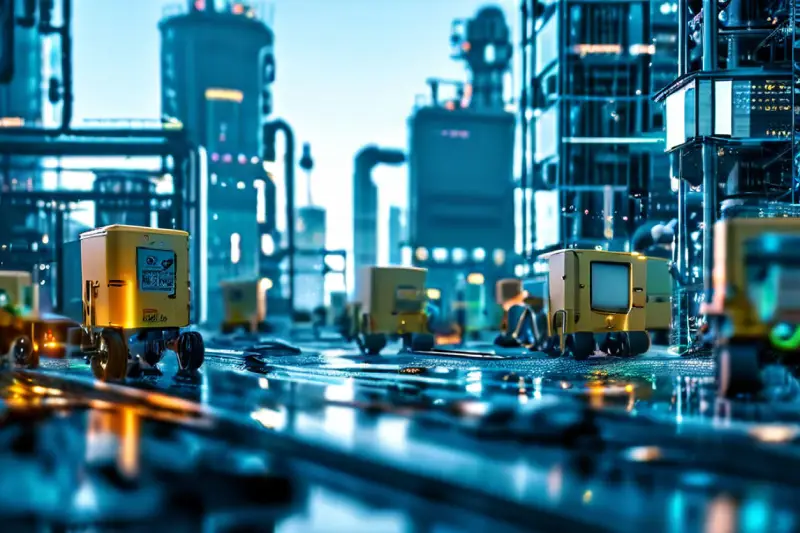Introduction
Smart waste management systems with AI are changing the way cities deal with waste. By incorporating AI technologies, urban areas can handle waste more efficiently and sustainably. These advanced systems use data analytics, machine learning, and sensors to optimize everything from collection to disposal. This not only cuts costs but also benefits the environment. Additionally, AI-driven waste management ensures timely collection, which keeps cities cleaner and improves public health. Embracing these smart waste management systems with AI is a key step toward creating smarter, cleaner, and more efficient cities.
Overview of Smart Waste Management Systems with AI
Smart waste management systems with AI are revolutionizing how cities handle waste. By leveraging artificial intelligence, data analytics, and IoT sensors, these systems improve efficiency and sustainability. For example, AI analyzes real-time data from smart bins, which helps optimize collection schedules and reduce unnecessary pickups. Consequently, cities experience cost savings and better resource management. Additionally, AI enhances recycling efforts by sorting materials more accurately. As more cities adopt these technologies, they are setting new standards for cleaner and smarter urban environments.
The Rise of AI in Waste Management
AI is making a significant impact on waste management. By analyzing data and predicting waste patterns, AI helps cities streamline both collection and sorting processes. This results in substantial cost savings and improved recycling rates. Moreover, AI-driven systems prevent bins from overflowing and maintain a cleaner cityscape. As urban areas increasingly integrate AI into their waste management strategies, they are advancing towards a more sustainable and efficient future.
Core Technologies Behind Smart Waste Management Systems
Smart waste management systems rely on several key technologies to enhance their efficiency. iot sensors are crucial, as they track waste levels in real time and send this information to central systems. This allows cities to optimize collection schedules. Additionally, artificial intelligence (AI) analyzes the data from these sensors to predict waste generation patterns and improve collection routes. Moreover, machine learning is used to refine sorting processes, ensuring that recyclable materials are accurately separated. Data analytics then provides valuable insights into system performance, helping to make further improvements. By integrating these technologies, smart waste management systems become more effective, cost-efficient, and environmentally friendly.

AI in Smart City Waste Management
Integrating AI in Urban Waste Management
Smart cities leverage advanced technologies to improve urban living. AI plays a crucial role in this transformation, especially in waste management. By integrating AI, cities can streamline their waste management systems, making them more efficient and responsive. AI algorithms analyze vast amounts of data collected from sensors and IoT devices, optimizing waste collection routes and schedules. This integration reduces the environmental impact and enhances the overall cleanliness of urban areas.
Benefits of AI in Smart Cities
The benefits of AI in smart cities are numerous. Real-time data collection and analysis significantly improve waste management operations. Sensors placed in waste bins monitor fill levels and send alerts when they need to be emptied. This reduces the chances of overflow and illegal dumping. Additionally, AI helps in predictive maintenance of waste management equipment, ensuring they function optimally. Consequently, cities can allocate resources more effectively, resulting in cost savings and improved public health.
Revolutionizing Waste Collection with Smart Bins with AI
What Are Smart Bins?
Smart bins are advanced waste receptacles equipped with AI-powered sensors and communication technologies. These bins can detect fill levels, sort waste, and even compact it. By integrating AI, smart bins provide real-time data on waste accumulation, enabling more efficient management and collection.
Features and Capabilities of AI-Powered Smart Bins
AI-powered smart bins offer several innovative features. They can monitor their fill status and send alerts when they need emptying. Additionally, some models can separate recyclables from non-recyclables, reducing contamination. The ability to compact waste also means fewer collections are needed, saving time and resources.
Enhancing Waste Collection Efficiency
The integration of AI in smart bins significantly enhances waste collection efficiency. Optimized collection routes are created based on real-time data, ensuring that bins are emptied only when necessary. This leads to reduced fuel consumption and lower carbon emissions. Consequently, cities can enjoy cleaner streets and reduced operational costs.

The Role of AI-Powered Sorting Robots
The Role of AI in Waste Sorting
AI-powered robots are transforming the waste sorting process, making recycling more efficient. These robots use advanced technologies to identify and separate different materials, greatly improving recycling rates. Consequently, the role of AI in waste sorting has become indispensable.
Advances in AI for Automated Waste Sorting
With the help of computer vision and machine learning, sorting robots can accurately distinguish between various types of waste. They scan items on a conveyor belt, identify their material composition, and sort them into appropriate bins. Additionally, this precision reduces contamination and enhances the quality of recycled materials.
Real-World Applications and Success Stories
Many cities and companies have successfully implemented AI-powered sorting robots. For instance, some recycling facilities have reported significant increases in recycling rates and operational efficiency. Moreover, these success stories highlight the potential of AI in achieving higher recycling rates and promoting sustainability.
AI-Based Waste Generation Prediction
Predictive Analytics in Waste Management
AI algorithms are revolutionizing waste management by predicting future waste generation. By analyzing historical data, these algorithms can identify patterns and trends that help forecast waste levels accurately.
How AI Predicts Waste Generation Patterns
Using machine learning, AI examines past waste collection data, seasonal trends, and various other factors to predict future waste generation. This predictive capability allows for more accurate and efficient planning. Consequently, it helps in optimizing collection schedules and resource allocation.
Benefits of Waste Generation Prediction
The advantages of predicting waste generation are substantial. For example, cities can optimize their waste collection routes, reducing operational costs and fuel consumption. Additionally, this technology ensures that waste bins are emptied before they overflow, improving urban cleanliness. Furthermore, for residential waste management, AI-based predictions can help allocate resources more effectively, ensuring timely collection and reducing waste-related issues in neighborhoods.

Resource Recovery in Smart Cities with AI
AI’s Role in Enhancing Resource Recovery
Resource recovery is crucial in promoting a circular economy within waste management. By optimizing waste-to-energy conversion and material recycling processes, AI significantly enhances resource recovery efforts. For instance, AI algorithms can analyze waste composition and determine the most efficient methods for extracting valuable materials and generating energy.
Moreover, the positive environmental impact of increased resource recovery facilitated by AI is substantial. By reducing landfill waste and minimizing the need for new raw materials, AI-driven resource recovery helps decrease pollution and conserve natural resources. Consequently, smart cities can achieve greater sustainability and contribute to a healthier environment.
Cost Savings in Waste Management with AI
AI significantly contributes to cost reduction in waste management by optimizing collection routes and resource allocation. By analyzing real-time data from sensors and IoT devices, AI can create more efficient routes for waste collection vehicles. Consequently, this reduces fuel consumption and operational costs.
Moreover, AI ensures that resources are allocated precisely where needed, avoiding unnecessary expenditures. For instance, predictive analytics can forecast waste generation, allowing for better planning and reducing the frequency of collections. As a result, cities can maintain cleaner environments while spending less. These cost savings ultimately benefit both municipalities and residents, promoting a more sustainable and efficient waste management system.
Challenges of Implementing AI in Waste Management
Technological and Operational Challenges
Implementing AI in waste management faces significant hurdles. Initial costs can be prohibitive, and concerns about data security are prominent. Infrastructure limitations, such as outdated equipment, also pose obstacles to effective deployment.
Overcoming Resistance to Change
Addressing these challenges is crucial for wider AI adoption in waste management. Educating stakeholders about AI’s long-term benefits and cost efficiencies is essential. Additionally, upgrading infrastructure and implementing robust data security measures are vital steps. By overcoming these obstacles, cities can harness AI’s potential for more efficient and sustainable waste management practices.
The Future of AI in Waste Management
Looking ahead, the future of AI in waste management appears promising. Advancements in technology continue to drive the development of more sophisticated AI solutions. These innovations enable smarter waste collection, enhanced recycling processes, and improved resource recovery. As AI algorithms become more refined and data collection methods more advanced, cities can expect increased efficiency, reduced environmental impact, and overall cleaner urban environments. Embracing AI in waste management not only optimizes operations but also paves the way for sustainable practices that benefit communities and the planet alike.
Conclusion
In conclusion, AI is poised to revolutionize waste management practices in urban environments. From optimizing collection routes and enhancing recycling processes to predicting waste generation and improving resource recovery, AI technologies offer substantial benefits. Despite challenges such as initial costs and data security concerns, the future outlook for AI in waste management remains optimistic. Continued advancements in AI will lead to even more sophisticated solutions, ensuring cleaner, more efficient cities for future generations. By embracing AI, municipalities can achieve significant cost savings, reduce environmental impact, and foster sustainable communities.



